陈述句变一般疑问句特殊疑问句及练习.doc
英语陈述句变一般疑问句 划线部分提问(特殊问句)归纳与总结

陈述句变一般疑问句1、首先看句子当中有没有be动词(am/is/are)或情态动词(can/will/would/should),如果有,则把他们提到句首;2、如果没有,则在句首加Do或Does(第三人称单数开头的一般现在时的句子用Does,并注意把谓语动词变为原形),3、一般疑问句的回答,肯定回答:Yes,主语代词+句首词.否定回答:No,主语代词+句首词与not的缩写形式。
2、四点注意:1、注意人称变化,2、注意大小写变化,3、注意标点符号的变化,4、注意把some变成any(would like句型除外)。
例:This is my pen.is 提到了句首第一人称变为第二人称,句号变为问号?一般疑问句:Is this your pen?肯定回答:Yes,this is. No,this isn’t.句首词主语代词句首词句首词和not的缩写例:Xiaoming goes to school by bike.分析:首先,句子当中没有be动词和情态动词,所以只能用Do或Does,因为主语Xiaoming 为第三人称单数,所以用Does,那么变为一般疑问句:Does Xiaoming go to schoo by bike? 肯定回答:Yes,he does. No,he doesn’t.句首词主语代词句首词句首词和not的缩写肯定句变否定句:首先看句子当中有没有be动词(am/is/are)或情态动词(can/will/would/should),如果有,则在他们后面加not;2、如果没有,则在主语后加Don”t或者Doesn’t(第三人称单数开头的一般现在时的句子用Doesn’t,并注意把谓语动词变为原形)对划线部分提问:1、首先看划线部分,根据划线部分的汉语意思判断特殊疑问词,并将特殊疑问词写在句首;2、然后把划线部分外的内容,变为一般疑问句,并写在特殊疑问词的后面。
3、注意:询问职业的用What do/does 人do? 或者What is/are 人称所有格job?询问爱好的用What is/are 人称所有格hobby/hobbies?询问动作时,注意加do特殊疑问词:What 对动作、事物提问Who 对人提问Where 对地点提问When 对时间提问How 对身体状态、出行方式提问Whoes 对某人的。
小学英语句型转换(陈述句变一般疑问句特殊疑问句及练习)

小学英语所有句型转换的方法基本助动词只有三个:be, do, have, 他们没有词汇意义,只有语法作用,如协助构成进行体,完成体,被动态,否定句,疑问句等。
一、肯定句改否定句的方法——一步法1、在be动词后加not。
如:is not ,are not ,am not,was not,were not;2、在can,should,will等后加not。
如:cannot,should not,will not;3、上述都没有的,在动词前加助动词否定形式don’t/doesn’t/didn’t。
4、some 改成any。
二、肯定句改一般疑问句的方法——三步法1、把be动词放在句首,剩下的照抄,(some 改成any,my改成your等)句点改成问号。
2、把can,shall,will等放到句首,剩下的照抄,(some 改成any,my改成your等)句点改成问号。
例如:陈述句: They are in the park. He can play the guitar..一般疑问句: Are they in the park? Can he play the guitar?把下列句子变成一般疑问句1. I am listening to music._______________________________________2. Mike is a student._______________________________________3. Sarah can clean the classroom.________________________________________4. They are in the zoo.________________________________________5. There are some flowers in the vase.________________________________________6.This is my sister._________________________________________7.We are sweeping the floor.__________________________________________3、上述都没有的,在句首请助动词Do/Does/Did帮忙,剩下的照抄,(some 改成any,my改成your等)句点改成问号。
【史上最强】重点小学英语句型转换(陈述句变一般疑问句特殊疑问句及练习测试)
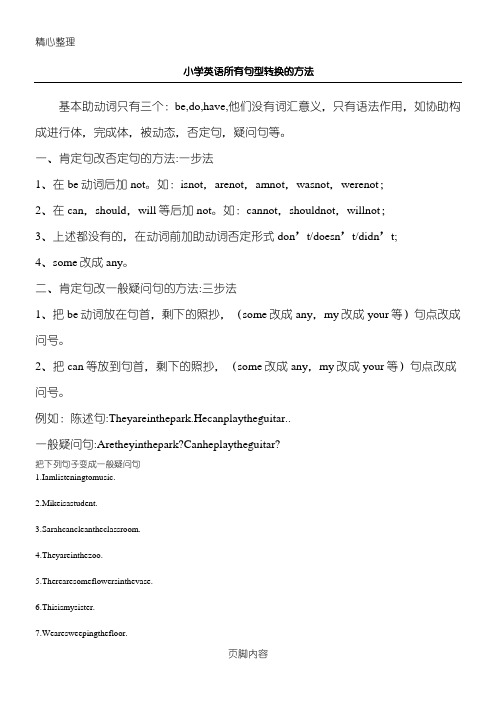
小学英语所有句型转换的方法基本助动词只有三个:be,do,have,他们没有词汇意义,只有语法作用,如协助构成进行体,完成体,被动态,否定句,疑问句等。
一、肯定句改否定句的方法:一步法1、在be动词后加not。
如:isnot,arenot,amnot,wasnot,werenot;2、在can,should,will等后加not。
如:cannot,shouldnot,willnot;3、上述都没有的,在动词前加助动词否定形式don’t/doesn’t/didn’t;4、some改成any。
二、肯定句改一般疑问句的方法:三步法1、把be动词放在句首,剩下的照抄,(some改成any,my改成your等)句点改成问号。
2、把can等放到句首,剩下的照抄,(some改成any,my改成your等)句点改成问号。
例如:陈述句:Theyareinthepark.Hecanplaytheguitar..一般疑问句:Aretheyinthepark?Canheplaytheguitar?把下列句子变成一般疑问句1.Iamlisteningtomusic._______________________________________2.Mikeisastudent._______________________________________3.Sarahcancleantheclassroom.________________________________________4.Theyareinthezoo.________________________________________5.Therearesomeflowersinthevase.________________________________________6.Thisismysister._________________________________________7.Wearesweepingthefloor.__________________________________________3、上述都没有的,在句首请助动词Do/Does/Did帮忙,剩下的照抄,(some改成any,my改成your等)句点改成问号。
陈述句变一般疑问句特殊疑问句及练习
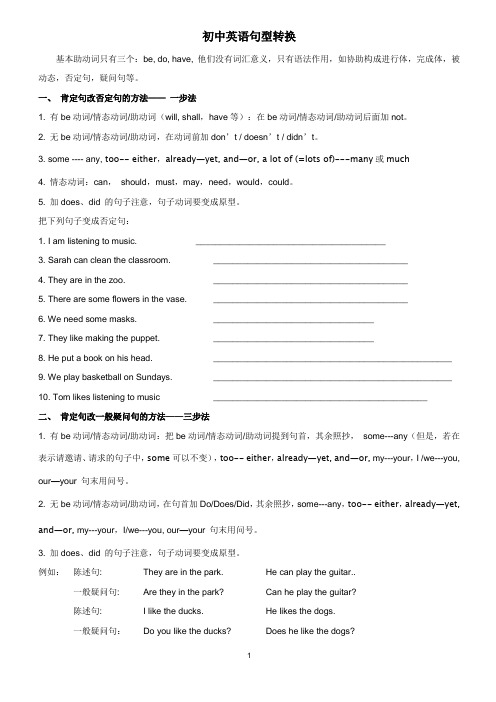
初中英语句型转换基本助动词只有三个:be, do, have, 他们没有词汇意义,只有语法作用,如协助构成进行体,完成体,被动态,否定句,疑问句等。
一、肯定句改否定句的方法——一步法1. 有be动词/情态动词/助动词(will, shall,have等):在be动词/情态动词/助动词后面加not。
2. 无be动词/情态动词/助动词,在动词前加don’t / doesn’t / didn’t。
3. some ---- any,too-- either,already—yet, and—or, a lot of (=lots of)---many或much4. 情态动词:can,should,must,may,need,would,could。
5. 加does、did 的句子注意,句子动词要变成原型。
把下列句子变成否定句:1. I am listening to music. _______________________________________3. Sarah can clean the classroom. ________________________________________4. They are in the zoo. ________________________________________5. There are some flowers in the vase. ________________________________________6. We need some masks. _________________________________7. They like making the puppet. _________________________________8. He put a book on his head. _________________________________________________9. We play basketball on Sundays. _________________________________________________10. Tom likes listening to music ____________________________________________二、肯定句改一般疑问句的方法——三步法1. 有be动词/情态动词/助动词:把be动词/情态动词/助动词提到句首,其余照抄,some---any(但是,若在表示请邀请、请求的句子中,some可以不变),too-- either,already—yet, and—or, my---your,I /we---you, our—your 句末用问号。
英语句型转换练习题高二

英语句型转换练习题高二一、从陈述句转换为一般疑问句1. He plays basketball every day.Does he play basketball every day?2. She is studying for her exams.Is she studying for her exams?3. They have visited China before.Have they visited China before?4. We will arrive at the airport on time.Will we arrive at the airport on time?5. The cat is sleeping on the bed.Is the cat sleeping on the bed?二、从陈述句转换为否定句1. He can swim very well.He cannot swim very well.2. She has finished her homework.She has not finished her homework.3. They were at the party last night.They were not at the party last night.4. We have enough time to complete the project.We do not have enough time to complete the project.5. They like to eat pizza.They do not like to eat pizza.三、从陈述句转换为选择疑问句1. She is going to the movies tonight or tomorrow?Is she going to the movies tonight or tomorrow?2. They have been to Paris or London before?Have they been to Paris or London before?3. We should study for the test now or later?Should we study for the test now or later?4. He wants to go to the beach or the park?Does he want to go to the beach or the park?5. The train arrives at 8 am or 9 am?Does the train arrive at 8 am or 9 am?四、从陈述句转换为感叹句1. He is so talented.How talented he is!2. She looks beautiful in that dress.How beautiful she looks in that dress!3. They have achieved incredible success.How incredible their success is!4. We won the championship!How we won the championship!5. The sunset is breathtakingly beautiful.How breathtakingly beautiful the sunset is!五、从陈述句转换为强调句1. I love playing the piano.It is playing the piano that I love.2. He ate all the cake.It was all the cake that he ate.3. They built a new school in the town.It was in the town that they built a new school. 4. The movie was directed by Steven Spielberg.It was Steven Spielberg who directed the movie. 5. She has won many awards for her artwork.It is her artwork that she has won many awards for.六、从陈述句转换为倒装句1. He is studying for the test.Studying for the test is he.2. The car was parked in front of the house.Parked in front of the house was the car.3. They have never been to Europe before.Never have they been to Europe before.4. We will go on a trip to the beach.On a trip to the beach will we go.5. He has finished his homework.Finished has he his homework.以上是我为你准备的高二英语句型转换练习题,希望对你的学习有所帮助。
小学英语句型转换(陈述句变一般疑问句特殊疑问句及练习)
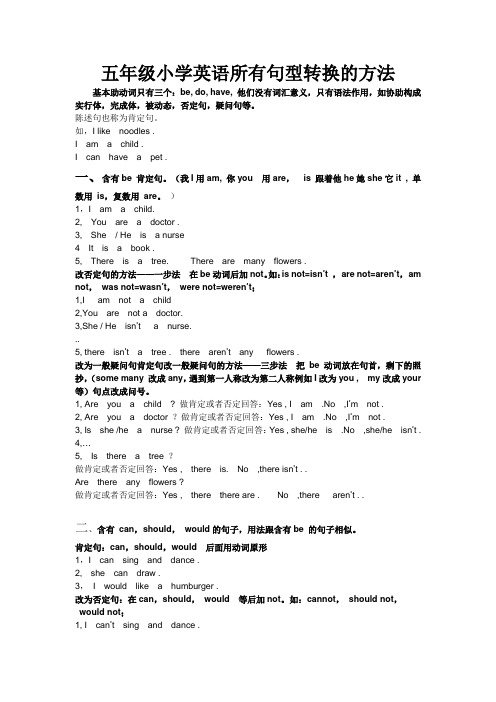
五年级小学英语所有句型转换的方法基本助动词只有三个:be, do, have, 他们没有词汇意义,只有语法作用,如协助构成实行体,完成体,被动态,否定句,疑问句等。
陈述句也称为肯定句。
如,I like noodles .I am a child .I can have a pet .一、含有be 肯定句。
(我I用am, 你you 用are,is 跟着他he她she它it , 单数用is,复数用are。
)1,I am a child.2, You are a doctor .3, She / He is a nurse4 It is a book .5, There is a tree. There are many flowers .改否定句的方法——一步法在be动词后加not。
如:is not=is n’t ,are not=aren’t,am not,was not=wasn’t,were not=weren’t;1,I am not a child2,You are not a doctor.3,She / He isn’t a nurse...5, there isn’t a tree . there aren’t any flowers .改为一般疑问句肯定句改一般疑问句的方法——三步法把be动词放在句首,剩下的照抄,(some many 改成any,遇到第一人称改为第二人称例如I改为you , my改成your 等)句点改成问号。
1, Are you a child ? 做肯定或者否定回答:Yes , I am .No ,I’m not .2, Are you a doctor ?做肯定或者否定回答:Yes , I am .No ,I’m not .3, Is she /he a nurse ? 做肯定或者否定回答:Yes , she/he is .No ,she/he isn’t . 4,…5, Is there a tree ?做肯定或者否定回答:Yes , there is. No ,there isn’t . .Are there any flowers ?做肯定或者否定回答:Yes , there there are . No ,there aren’t . .二、含有can,should,would的句子,用法跟含有be 的句子相似。
初中英语句型转换(陈述句变一般疑问句特殊疑问句及练习)
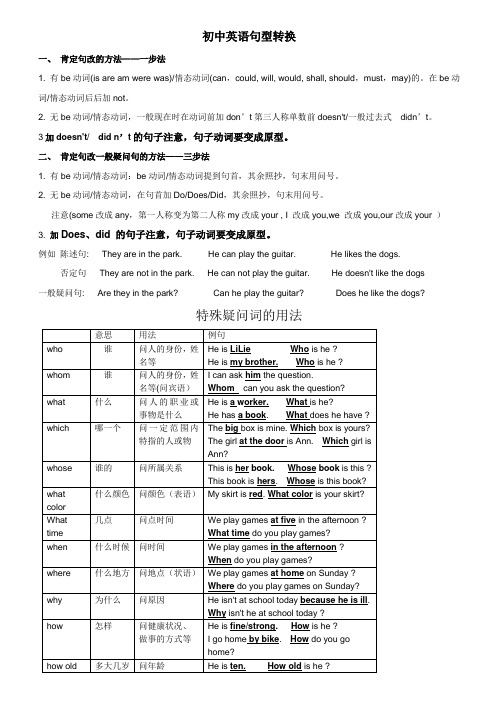
3 加 doesn't/ did n’t 的句子注意,句子动词要变成原型。
二、 肯定句改一般疑问句的方法——三步法
1. 有 be 动词/情态动词:be 动词/情态动词提到句首,其余照抄,句末用问号。
2. 无 be 动词/情态动词,在句首加 Do/Does/Did,其余照抄,句末用问号。
注意(some 改成 any,第一人称变为第二人称 my 改成 your , I 改成 you,we 改成 you,our 改成 your )
My book is over there. Whose book is over there ?
主语的定语 主语 谓语
疑问词 主语 谓语
以上两点方法都是:
用正确的疑问词代替画线部分,再把句号改为问号,其余部分一般不做改变
3.对表语或宾语的定语部分提问,其语序是:
疑问词+表语或宾语(画线部分所修饰的名词)+一般疑问句(省略画线部分和它所修饰的名词)
一般疑问句: Are they in the park?
Can he play the guitar?
Does he like the dogs?
综合练习: 1. The children have a good time in the park. 否定句:___________________________________ 一般疑问句:___________________________________ 2. There are about nine hundred people at the concert.(音乐会) 否定句:_________________________________ 一般疑问句:________________________________________ 对划线部分提问:____________________________________ 3. There is only one problem. 否定句:_____________________________________ 一般疑问句:________________________________________ 肯定/否定回答:____________________________________ 4. Ann does her homework every evening. 否定句:__________________________________________ 一般疑问句:________________________________________ 对划线部分提问:____________________________________ 5. I read an English book every day. 否定句:__________________________________________ 一般疑问句:________________________________________ 肯定/否定回答:____________________________________ 对划线部分提问:____________________________________ 6. My brother is in the park now. 否定句:____________________________________ 一般疑问句:________________________________________ 肯定/否定回答:__________________________ 对划线部分提问:____________________________________ 7. She has some bread for lunch today. 否定句:__________________________________________ 一般疑问句:_________________________________ 肯定/否定回答:____________________________________ 8. They read English every day. 否定句:___________________________________ 一般疑问句:________________________________________ 肯定/否定回答:____________________________________ 对划线部分提问:____________________________________
英语陈述句变一般疑问句特殊疑问句及练习

英语句型转换方法及练习一、肯定句改否定句的方法——一步法1.有be动词/情态动词:在be动词/情态动词后后加not。
2.无be动词/情态动词,在动词前加don’t/doesn’t/didn’t。
3.肯定句中的some改成any。
4.Be动词am,is,are.情态动词:can,will,should,must,may。
练习~~~把下列句子变成否定句:1.I am listening to music._______________________________________2.Mike is a student._______________________________________3.Sarah can clean the classroom._______________________________________4.They are in the zoo._______________________________________5.There are some flowers in the vase._______________________________________6.This is my sister._______________________________________7.We are sweeping the floor.___________________________8.We need some masks._________________________________9.They like making the puppet._________________________________10.Su Hai and Su Yang live in a new house.______________________________________________11.I put a book on my head._________________________________________________12.They sing“In the classroom”together._______________________________________________13.We play basketball on Sundays._________________________________________________14.Tom likes listening to music.____________________________________________15.We go to school on Sunday._________________________________________________16.His father works hard._________________________________________________17.Alice will go to the Summer Palace.____________________________________________18.You should study hard for yourself.__________________________________________二、肯定句改一般疑问句的方法——三步法1.有be动词/情态动词:be动词/情态动词提到句首,其余照抄,(some改any,my改your)句末用问号。
一般疑问句和特殊疑问句讲解及练习

一般疑问句一、一般疑问句用Yes或No作答的疑问句叫一般疑问句;其结构是be动词am/is/are//+主语+其他成分通常回答为:肯定:Yes,+主语+提问的词.否定:No,+主语+提问的词+not.AreyoufromJapan﹖Yes,Iam./No,I'mnot.Ishersisterdoingherhomeworknow﹖Yes,sheis./No,sheisn't.Doesheworkinabank﹖Yes,hedoes./No,hedoesn't.CanyouspeakFrench﹖Yes,Ican./No,Ican't.一.要将陈述句变成一般疑问句,可以遵循下列步骤:1.如句中有be动词am、is、are、was、werecan、may、must…可直接将它们提到句首,句末打上问号即可;主语为第一人称,应将其改为第二人称;例:Itwasrainyyesterday.→WasitrainyyesterdayTom'sfathercanplaythepiano.→CanTom'sfatherplaythepiano2.如果句中没有be动词、助动词或情态动词,则根据谓语动词的形式借助do的相应形式放在句首;具体方法是:如果谓语动词是原形,则借do;如果谓语动词是一般现在时第三人称单数形式,则借does;如果谓语动词是过去式,则借did.需要注意的是,借does或did后,原句的谓语动词要变回原形;例:Theygotoschoolbybike.→DotheygotoschoolbybikeBillgetsupat6:30everyday.→Doesbillgetupat6:30everydayThestudentssawafilmyesterday.→Didthestudentsseeafilmyesterday二.陈述句变一般疑问句应注意的事项1.如果陈述句中有第一人称,则变问句时最好要变为第二人称;例:Iusuallyhavelunchatschool.→DoyouusuallyhavelunchatschoolMyfatherisplayingsoccer.→Isyourfatherplayingsoccer2.如果陈述句中有some,则变问句时往往要变成any;例:Thereissomewaterontheplayground.→Isthereanywaterontheplayground3.复合句变一般疑问句通常只变主句,从句不变;例:IknowhecomesfromCanada.→DoyouknowhecomesfromCanada4.如果句中含实义动词have且表示“有”时,除借do外,也可将其直接提到句首;例:IhavesomefriendsinAmerica.→HaveyouanyfriendsinAmerica /Doyouhaveanyfrien dsinAmerica三.一般疑问句的回答1.第一个词:不是Yes就是No;有时根据语气的不同,Yes可由Sure,Certainly,Ofcourse等代替.NO可由sorry代替.2.第二个词:问谁答谁;即答语中的主语须与问句的主语一致必须用主格代词; 例:Doesshecleanherroomeveryday Yes,shedoes.IsAnna′sfatheradoctor No,heisn′t.如果主语是thisthat,回答时用it代替;Isthisyourpen Yes,itis.No,itisn't.如果问句中主语these,those,回答时用they代替;Arethoseyourbooks Yes,theyare.No,theyaren't.3.第三个词:用什么问,用什么答;即用问句中的提问词;CanJimplaysoccer Yes,hecan.DoesMrBeanspeakEnglish Yes,hedoes.需注意问题:用may引导的问句,肯定回答用may,否定回答用can′t或mustn′t,用must引导的问句,肯定回答用must,否定回答用needn′t/don’thaveto例:MayIgototheparknow Yes,youmay./No,youmustn′t. MustIwashmyclothesnow Yes,youmust./No,youneedn′t.4.作否定回答时,结尾要加上not;否定回答最好缩写,而肯定回答不能缩写; 例:DidThomascomehereyesterday Yes,hedid./No,hedidn′t.IsLinLininClass3 Yes,sheis./No,sheisn′t.特殊疑问句以疑问词开头,对句中某一成分提问的句子叫特殊疑问句;常用的疑问词有:what 什么,who谁,whose谁的,which哪个,when何时,where哪里,how怎样,通过...,why 为何等;特殊疑问句有两种语序:1.如疑问词作主语或主语的定语,即对主语或主语的定语提问,其语序是陈述句的语序:疑问词+主语+谓语动词+其他成分如:whoissingingintheroom﹖whosebikeisbroken﹖2.如疑问词作其他成分,即对其他成分提问,其语序是:疑问词+一般疑问句语序如:whatclassareyouin﹖Whatdoesshelooklike﹖Whereareyoufrom﹖Whattimedoeshegetupeverymorning﹖Howdoyouknow﹖注意:1.回答特殊疑问句时,不能用yes/no,即问什么答什么,尤其是简略回答;如:WhoisfromCanada﹖Helenis.Where'stherestaurant﹖Nearthestation.Whydoyoulikekoalas﹖Becausetheyarecute.一、陈述句变一般疑问句1.HisfatherisanEnglishteacher.___________________________________________2.Thesecatsarecrying.喊叫___________________________________________3.Theycanswim.___________________________________________4.Iliketoread阅读English.___________________________________________5.Igotoschoolonfoot.走路___________________________________________6.Thechildrenhadagoodtimeinthepark公园.___________________________________________7.Hisfathergoestoworkbybus.乘公共汽车___________________________________________8.Theboyunderthetree树ishungry.饥饿___________________________________________9.Hegoestoschooleveryday.___________________________________________10.Iwanttohaveamodelcar摩托车.___________________________________________11.Mrs.LiandKittywatchTVatnight在晚上.___________________________________________12Theboydoessomehousework家庭作业athome.___________________________________________二、把肯定句变为否定句1.HisfatherisanEnglishteacher.____________________________________________.2.Thesecatsarecrying.喊叫____________________________________________.3.Theycanswim.____________________________________________.4.Hisfathergoestoworkbybus.乘公共汽车_______________________________________________.5.Tomhassomeapples.___________________________________________.6.Thechildrenhadagoodtimeinthepark公园.___________________________________________.7.Mrs.LiandKittywatchTVatnight在晚上.___________________________________________.8.Theboydoessomehousework家庭作业athome.___________________________________________.三、作肯定和否定回答1、Isthisyourpencil-case肯定回答:___________________.否定回答:___________________.2、Isthathisbackpack肯定回答:___________________.否定回答:___________________.3、Aretheseherbrothers肯定回答:___________________.否定回答:___________________.4、ArethoseTom’s parents肯定回答:___________________.否定回答:___________________.5、Canyouplaytheguitar肯定回答:___________________.否定回答:___________________.6、DotheylikeFrenchfries肯定回答:___________________.否定回答:___________________.7、Doeshelikepears肯定回答:___________________.否定回答:___________________.8、MayIaskyourquestion肯定回答:___________________.否定回答:___________________.9、Isheyourfather肯定回答:___________________.否定回答:___________________.10、AreyoufromChina.肯定回答:___________________.否定回答:___________________.特殊疑问句习题:就划线部分提问1.Theyboughtanewbikeyesterday.____________________________________________________2.Sheismyteacher.___________________________________3.Itismycoat.______________________________________4.Iamlookingformysister.____________________________________________________5.Igetupatsix.____________________________________________________6.IamfromHubei.__________________________________________________7.IwenttoschoollatebecauseIgotuplate.____________________________________________________8.Iamgettingonwellwithit.____________________________________________________9.Mybagisred._______________________________________10.Theyarefiveyuan.______________________________________________________11.Iwashittwiceaweek.______________________________________________________12.Hewillbebackinfourdays._一般将来时一、单项选择1.Iftheycome,we________ameeting.A.haveB.willhaveC.hadD.wouldhave2.He________herabeautifulhatonhernextbirthday.A.givesB.gaveC.willgivingD.isgoingtogive3.He________tousassoonashegetsthere.A.writesB.haswrittenC.willwriteD.wrote4.–WillhisparentsgotoseetheTerraCottaWarriorstomorrow–No,________不去.A.theywilln’tB.theywon’t.C.theyaren’tD.theydon’t.5.Who________we________swimmingwithtomorrowafternoonA.will;goB.do;goC.will;goingD.shall;go6.We________theworkthiswaynexttime.A.doB.willdoC.goingtodoD.willdoing7.Tomorrowhe________akiteintheopenairfirst,andthen________boatinginthepark.A.willfly;willgoB.willfly;goesC.isgoingtofly;willgoesD.flies;willgo8.Thedayaftertomorrowthey________avolleyballmatch.A.willwatchingB.watchesC.iswatchingD.isgoingtowatch9.There________abirthdaypartythisSunday.A.shallbeB.willbeC.shallgoingtobeD.willgoingtobe10.They________anEnglisheveningnextSunday.A.arehavingB.aregoingtohaveC.willhavingD.isgoingtohave11.He________thereattentomorrowmorning.A.willB.isC.willbeD.be12.It________theyearofthehorsenextyear.A.isgoingtobeB.isgoingtoC.willbeD.willis13.________openthewindowA.WillyoupleaseB.PleasewillyouC.YoupleaseD.Doyou14.It________usalongtimetolearnEnglishwell.A.takesB.willtakeC.spendsD.willspend15.Thetrain________at11.A.goingtoarriveB.willbearriveC.isgoingtoD.isarriving二、用所给动词的一般将来时填空1.I______leaveinaminute.I______finishallmyworkbeforeI______leave.2.Iamafraidthere___________beameetingthisafternoon.Ican’tjoinyou.3.I___________betired.I___________gotobedearlytonight.4.Mary’sbirthdayisnextMonday,hermother__________giveherapresent.5.Itisverycoldthesedays.It___________snowsoon.6.—__________you__________beherethisSaturday—No.I___________visitmyteacher.7.—__________I________getyouacopyoftoday’snewspaper —Thankyou.情态动词1.—Mustweleavenow—No,we_______.Westillhavetwomorehours.A.can’tB.mustn’tC.needn’tD.shouldn’t2.—Canyourideahorse—No.I____.A.needn'tB.maynotC.can'tD.mustn't3.Youeatthesoupifyoudon'tlikeit.A.shouldn'tB.mustn'tC.needn'tD.can't4._____youwaitafewmoreminutes It'llbeyourturnsoon,A.MustB.ShouldC.CouldD.Might5.She_______behere.Isawhercomein.A.canB.mayC.shouldD.must6.Ican’tgotothecinemawithyoubecauseI___________stayhereuntilmymotherc omesback.A.canB.couldC.mayD.must7.—Bequiet,Mr.Smithiscoming.—Don’tworry.It___behim.Mr.Smithismuchtaller.A.mustn’tB.mustC.can’t8.—Hey,TedYou_______neverplayin thestreet.It’snotsafe.—Sorry,Mum.Iwon’tagain.A.needB.mustC.canD.may9.—HowlongmayIkeepthebook—You________keepitfortwoweeks.A.mayB.mustC.will10.—MayIsmokehere,please—Iamafraidyou.Thisisanon-smokingarea.A.canB.can’t C.mayD.maynot11.—MustIreturnthebookthisweek—No,you____.Youcan_itfor20days.A.mustn’t;keepB.needn't;borrowC.needn't;keepD.mustn't;borrow12.—CouldIuseyoureraserforawhile —Yes,ofcourseyou_.A.couldB.canC.willD.Should13—________IwatchTVnow,Mom—No.It’stoolate,andyou______gotobed.A.May;havetoB.Will;shouldC.Can;willD.Must;need14.—MustIfinishmyhomeworktoday,MsLiu—No,_______.A.youmustn’tB.youdon’thavetoC.youcan’t15.Accordingtothenewtrafficlaws,people______driveafterdrinkingwineorbe er.A.wouldn’tB.couldn’tC.needn’tD.mustn’t16.—Who’ssinginginthenextroom—It____beher.ShehasgonetoNewYork.A.can’tB.mustC.shouldn’tD.can。
陈述句变疑问句练习

一、陈述句→一般疑问句(一)更正区域:1.I am an outgoing boy.2.She is talking to her friends happily.3.Jack can jump really high.4.They need to make the kite fly more easily.5.We shall meet at 8:00 tomorrow morning.6.Everyone should pay a part in protecting the environment.7.Linda didn’t do her homework yesterday.8.My dad has gone to Shanghai on business.9.She used to dance in the morning every day.10.John hadn’t worked in the school since he retired.11.You should drink some hot tea with honey.更正区域:2.It sound like you have a fever.3.He played computer games all the weekend.4.That’s probably why.5.You need to take breaks away from the computer.6.Her head and neck still hurt yesterday.7.People often don’t help others because they don’t want any trouble.8.The man was saved by the doctors in time.9.Some passengers helped Mr. Wang to move the man onto thebus.10.Wang ping expects most or all of the passengers to get off.21.I am an outgoing boy.一般疑问句:更正区域:特殊疑问句:2.She is talking to her friends happily.一般疑问句:特殊疑问句:3.Jack can jump really high.一般疑问句:特殊疑问句:4.They need to make the kite fly more easily.一般疑问句:特殊疑问句:5.We shall meet at 8:00 tomorrow morning.一般疑问句:特殊疑问句:6.Everyone should pay a part in protecting the environment.一般疑问句:特殊疑问句:7.Linda didn’t do her homework yesterday.一般疑问句:特殊疑问句:8.My dad has gone to Shanghai on business.一般疑问句:特殊疑问句:9.She used to dance in the morning every day.一般疑问句:特殊疑问句:10.John hadn’t worked in the school since he retired.一般疑问句:特殊疑问句:34二、陈述句碱→特殊疑问句(二)11. You should drink some hot tea with honey.一般疑问句: 特殊疑问句: 12. It sound like you have a fever.一般疑问句: 特殊疑问句: 13. He played computer games all the weekend.一般疑问句: 特殊疑问句: 14. That’s probably why.一般疑问句: 特殊疑问句: 15. You need to take breaks away from the computer.一般疑问句: 特殊疑问句: 16. Her head and neck still hurt yesterday.一般疑问句: 特殊疑问句:17. People often don’t help others because they don’t want any trouble.一般疑问句: 特殊疑问句: 18. The man was saved by the doctors in time.一般疑问句: 特殊疑问句:19. Some passengers helped Mr. Wang to move the man onto the bus.一般疑问句: 特殊疑问句: 20. Wang ping expects most or all of the passengers to get off.一般疑问句:特殊疑问句:更正区域:5。
句型转换陈述句变一般疑问句特殊疑问句及练习修订版
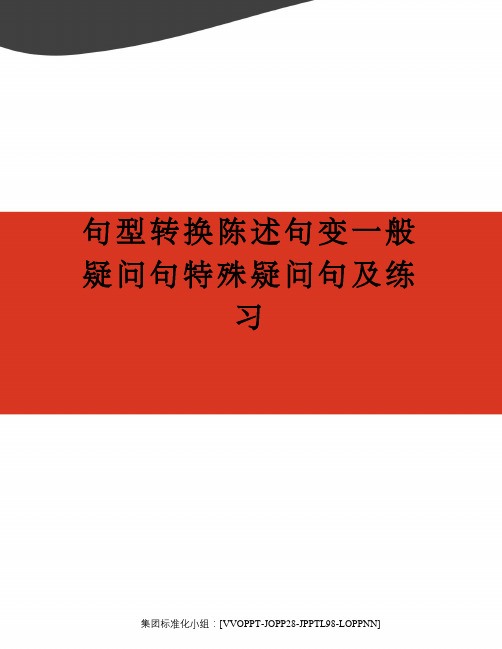
句型转换陈述句变一般疑问句特殊疑问句及练习集团标准化小组:[VVOPPT-JOPP28-JPPTL98-LOPPNN]初中英语句型转换一、肯定句改否定句的方法——一步法1. 有be动词/情态动词:在be动词/情态动词后后加not。
2. 无be动词/情态动词,在动词前加don’t / doesn’t / didn’t。
3. 肯定句中的some 改成any。
4. Be动词 am, is , are . 情态动词:can,will,should,must,may。
~~~把下列句子变成否定句:1. I am listening to music. _______________________________________2. Mike is a student. _______________________________________3. Sarah can clean the classroom. _______________________________________4. They are in the zoo. _______________________________________5. There are some flowers in the vase. _______________________________________6. This is my sister. _______________________________________7. We are sweeping the floor. ___________________________8. We need some masks. _________________________________9. They like making the puppet. _________________________________10. Su Hai and Su Yang live in a new house.______________________________________________11. I put a book on my head. _________________________________________________12. They sing “In the classroom” together._______________________________________________13. We play basketball on Sundays. _________________________________________________14. Tom likes listening to music. ____________________________________________15. We go to school on Sunday. _________________________________________________16. His father works hard. _________________________________________________17. Alice will go to the Summer Palace. ____________________________________________18. You should study hard for yourself . __________________________________________二、肯定句改一般疑问句的方法——三步法1. 有be动词/情态动词:be动词/情态动词提到句首,其余照抄,(some改any,my改your)句末用问号。
初中英语七年级必备-整理版-句型转换(陈述句变一般疑问句特殊疑问句及练习)
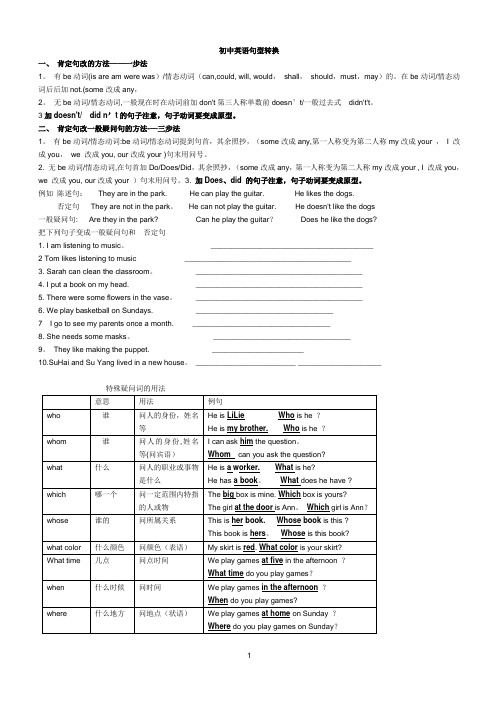
初中英语句型转换一、 肯定句改的方法——一步法1。
有 be 动词(is are am were was)/情态动词(can,could, will, would, shall, should,must,may)的。
在 be 动词/情态动 词后后加 not.(some 改成 any,2。
无 be 动词/情态动词,一般现在时在动词前加 don't 第三人称单数前 doesn’t/一般过去式 didn't't。
3 加 doesn't/ did n’t 的句子注意,句子动词要变成原型。
二、 肯定句改一般疑问句的方法-—三步法1。
有 be 动词/情态动词:be 动词/情态动词提到句首,其余照抄,(some 改成 any,第一人称变为第二人称 my 改成 your , I 改成 you, we 改成 you, our 改成 your )句末用问号。
2. 无 be 动词/情态动词,在句首加 Do/Does/Did,其余照抄,(some 改成 any,第一人称变为第二人称 my 改成 your , I 改成 you,we 改成 you, our 改成 your )句末用问号。
3. 加 Does、did 的句子注意,句子动词要变成原型。
例如 陈述句: They are in the park.He can play the guitar.否定句 They are not in the park。
He can not play the guitar.He likes the dogs. He doesn't like the dogs一般疑问句: Are they in the park?Can he play the guitar?Does he like the dogs?把下列句子变成一般疑问句和 否定句1. I am listening to music。
(完整)初中英语句型转换(陈述句变一般疑问句特殊疑问句及练习)
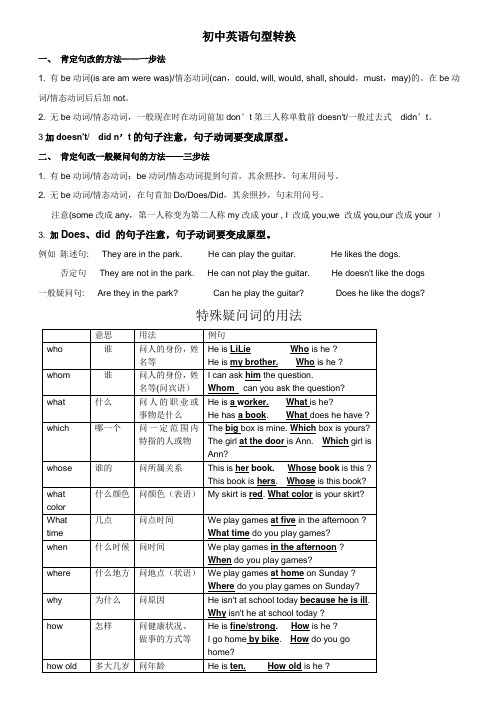
初中英语句型转换一、 肯定句改的方法——一步法1. 有 be 动词(is are am were was)/情态动词(can,could, will, would, shall, should,must,may)的。
在 be 动词/情态动词后后加 not。
2. 无 be 动词/情态动词,一般现在时在动词前加 don’t 第三人称单数前 doesn't/一般过去式 didn’t。
3 加 doesn't/ did n’t 的句子注意,句子动词要变成原型。
二、 肯定句改一般疑问句的方法——三步法1. 有 be 动词/情态动词:be 动词/情态动词提到句首,其余照抄,句末用问号。
2. 无 be 动词/情态动词,在句首加 Do/Does/Did,其余照抄,句末用问号。
注意(some 改成 any,第一人称变为第二人称 my 改成 your , I 改成 you,we 改成 you,our 改成 your )3. 加 Does、did 的句子注意,句子动词要变成原型。
例如 陈述句: They are in the park.He can play the guitar.He likes the dogs.否定句 They are not in the park. He can not play the guitar. He doesn't like the dogs一般疑问句: Are they in the park?Can he play the guitar?Does he like the dogs?特殊疑问词的用法who whom what whichwhose what color What time when where why howhow old意思 谁 谁什么 哪一个谁的 什么颜色用法 问人的身份,姓 名等 问人的身份,姓 名等(问宾语) 问人的职业或 事物是什么 问一定范围内 特指的人或物问所属关系问颜色(表语)例句He is LiLieWho is he ?He is my brother. Who is he ?I can ask him the question.Whom can you ask the question?He is a worker. What is he?He has a book. What does he have ?The big box is mine. Which box is yours?The girl at the door is Ann. Which girl isAnn?This is her book. Whose book is this ?This book is hers. Whose is this book?My skirt is red. What color is your skirt?几点 什么时候 什么地方 为什么 怎样多大几岁问点时间 问时间 问地点(状语) 问原因 问健康状况、 做事的方式等 问年龄We play games at five in the afternoon ? What time do you play games? We play games in the afternoon ? When do you play games? We play games at home on Sunday ? Where do you play games on Sunday? He isn't at school today because he is ill. Why isn't he at school today ? He is fine/strong. How is he ? I go home by bike. How do you go home? He is ten. How old is he ?how多少跟复数名词, There are thirty boys in my class.many问数量How many boys are there in your class?how多少跟不可数名词 There is some milk in the bottle.much问数量或价钱 How much milk is there in the bottle?how far 多远问路程It's five kilometers away from here?How far is it from here?how soon 多久问 in+一段时间 He can finish it in half an hour.How soon can he finish it ?how long 多久问一段时间, He has lived here for a year.问物体的长短 How long has he lived here?The desk is one meters long.How long is the desk ?how often 多久问频率I go to see my parents once a month.(一次)How often do you go to see your parents?How 的疑问句辨析一、how many 和 how much 的区别how many 用来询问可数名词的数量,它的句式是:How many+复数名词+一般疑问句+? how much 用来询问不可数名词的数量,也可询问价格。
小学英语句型转换(陈述句变一般疑问句特殊疑问句及练习)

小学英语所有句型转换的方法基本助动词只有三个:be, do, have, 他们没有词汇意义,只有语法作用,如协助构成进行体,完成体,被动态,否定句,疑问句等。
一、肯定句改否定句的方法——一步法1、在be动词后加not。
如:is not ,are not ,am not,` was not,were not;2、在can,should,will等后加not。
如:cannot,should not,will not;3、在动词前加助动词的否定形式don’t/doesn’t。
4、some 改成any。
1. We need some food.We don’t need any food.2. They like going hiking._________________________________3. She lives in China.______________________________________ ___________4.His name is john.______________________________________ ___________6.We play basketball on Sunday. ______________________________________ ___________7. Tom doesn’t like listening tomusic.______________________________________ ______二、肯定句改一般疑问句的方法——三步法1、把be动词放句首,剩下的照抄,(some 改成any,my改成your,I am改成Are you等),句号改成问号。
2、把can,shall,will等放句首,剩下的照抄,(some 改成any,my改成your 等)句号改成问号。
例如:陈述句: They are in the park. He can play the guitar..一般疑问句: Are they in the park?Can he play the guitar?把下列句子变成一般疑问句,作否定回答1. Are you listening to music? _______________________________________ 2. Mike is a student._______________________________________ 3. Sarah can clean the classroom.________________________________________ 4. They are in the zoo.________________________________________ 5. This is my sister._________________________________________ 3、上述都没有的,在句首请助动词Do/Does帮忙,剩下的照抄,(some 改成any,my改成your等)句点改成问号。
陈述句、疑问句等句型转换及练习(大量)

句型转换一、肯定句变否定句:1、在be动词后加not。
如:is not ,are not ,am not,was not,were not;2、在情态动词can,should,will等后加not。
如:cannot,should not,will not;3、既有be动词又有情态动词,在情态动词后加not。
如:There won’t be a meeting.4、上述都没有的,在动词前加助动词否定形式don’t/doesn’t/didn’t。
特殊情况:1. 如果肯定句中有连词and ,变为否定句时,通常要将and 变为or 。
例如:The girl can sing and dance. → The girl cannot sing or dance.2. 如果肯定句中some ,变为否定句时,some 一般要改为any 。
例如:)There are some boys in the room. → There are not any boys in the room.3. 如果肯定句中有too (也),变为否定句时,应将too 改为either 。
例如:Wang Ling is a teacher, too. → Wang Ling is not a teacher, either.4. 如果肯定句中有already ,变为否定句时,应将already 改为yet ,并放在句末。
例如:The worker has finished his work already. → The worker has not finished his work yet.5. 如果肯定句中有“ had better ”,变为否定句时,not 要放在“ had better ”之后。
例如:You had better write to your teacher. → You had better not write to your teacher.6. 如果肯定句中有always ,变为否定句时,要将always 改为never 。
英语中把陈述句改为一般疑问句和特殊疑问句

英语中把陈述句改为一般疑问句和特殊疑问句,否定句的题一、陈述句:是用来陈述一件事情或表示一种看法,可分为肯定句和否定句两种形式。
1、谓语动词是be动词,助动词have, has, will,情态动词can等时,只要直接在这些词后面加not就构成否定形式。
eg. Lily has already read this new book. (改为否定句)Lily ______ ______ this new book ________.2、谓语动词是行为动词而又没有助动词或情态动词时,必须在谓语动词前加助动词,一般现在时加助动词do ,第三人称单数加does,一般过去时加did,再和not构成否定结构。
必须指出的是:don't, doesn't, didn't后都用动词原形。
eg.1)Jill has lunch at school every day. (改为否定句)Jill _____ _____ lunch at school every day.2)The children had a good time at the party. (改为否定句)The children ______ _____ a good time at the party.3)Rose didn't drink any milk this morning.(改为肯定句)Rose ______ ______ milk this morning.二、疑问句:是用来提出问题的句子。
A.一般疑问句:以be动词, have /has/do等助动词、can/may等情态动词开头,以yes或no来回答的问句。
它的基本结构是:Be/Have /Has/Did等助动词(包括情态动词)+主语+谓语(包括表语)+┄?回答常用简略回答。
1、谓语动词是be动词、助动词、情态动词时,只要直接把这些词置于句首,句末改成问号。
- 1、下载文档前请自行甄别文档内容的完整性,平台不提供额外的编辑、内容补充、找答案等附加服务。
- 2、"仅部分预览"的文档,不可在线预览部分如存在完整性等问题,可反馈申请退款(可完整预览的文档不适用该条件!)。
- 3、如文档侵犯您的权益,请联系客服反馈,我们会尽快为您处理(人工客服工作时间:9:00-18:30)。
初中英语句型转换基本助动词只有三个:be, do, have, 他们没有词汇意义,只有语法作用,如协助构成进行体,完成体,被动态,否定句,疑问句等。
一、肯定句改否定句的方法——一步法1. 有be动词/情态动词/助动词(will, shall,have等):在be动词/情态动词/助动词后面加not。
2. 无be动词/情态动词/助动词,在动词前加don’t / doesn’t / didn’t。
3. some ---- any,too-- either,already—yet, and—or, a lot of (=lots of)---many或much4. 情态动词:can,should,must,may,need,would,could。
5. 加does、did 的句子注意,句子动词要变成原型。
把下列句子变成否定句:1. I am listening to music. _______________________________________3. Sarah can clean the classroom. ________________________________________4. They are in the zoo. ________________________________________5. There are some flowers in the vase. ________________________________________6. We need some masks. _________________________________7. They like making the puppet. _________________________________8. He put a book on his head. _________________________________________________9. We play basketball on Sundays. _________________________________________________10. Tom likes listening to music ____________________________________________二、肯定句改一般疑问句的方法——三步法1. 有be动词/情态动词/助动词:把be动词/情态动词/助动词提到句首,其余照抄,some---any(但是,若在表示请邀请、请求的句子中,some可以不变),too-- either,already—yet, and—or, my---your,I /we---you, our—your 句末用问号。
2. 无be动词/情态动词/助动词,在句首加Do/Does/Did,其余照抄,some---any,too-- either,already—yet, and—or, my---your,I/we---you, our—your 句末用问号。
3. 加does、did 的句子注意,句子动词要变成原型。
例如:陈述句: They are in the park. He can play the guitar..一般疑问句: Are they in the park? Can he play the guitar?陈述句: I like the ducks. He likes the dogs.一般疑问句:Do you like the ducks? Does he like the dogs?把下列句子变成一般疑问句1. I am listening to music. _______________________________________2. Mike is a student. _______________________________________3. Sarah can clean the classroom. ________________________________________4. There are some flowers in the vase. ________________________________________5. We need some masks. _________________________________6. They like making the puppet. _________________________________7. Su Hai and Su Yang live in a new house. _________________________________________________8. He put a book on his head. _________________________________________________9. We play basketball on Sundays. _________________________________________________10. Tom likes listening to music ____________________________________________三、肯定句改特殊疑问句的方法——四步法关于特殊疑问词问人(谁/谁的)who/whom/whose地点(何地)where时间when、what time、how long、how soon 东西/职业/事物(什么) what方式方法程序身体(怎样)how年龄how old.. 怎么样(提建议)How about多少钱How much问星期what day 问日期what date 问数量多少(可数名词) How many 问数量(不可数名词)How much 颜色what color 班级what class 年级what grade 时间what time 哪一个whichwhich class肯定句变特殊疑问句(就划线部分提问):分3步骤第一步:先变一般疑问句第二步:找合适的特殊疑问词代替划线部分第三步:特殊疑问词提前放到句首,并大写,其余按顺序照抄,省略划线部分。
注意:1.一定先变一般疑问句。
但如果问的是主语或主语的定语时,语序不变。
综合练习:1.The children have a good time in the park.否定句:___________________________________2. There are about nine hundred people at the concert.(音乐会)一般疑问句:________________________________________对划线部分提问:____________________________________3. There is only one problem.否定句:__________________________________________一般疑问句:________________________________________4. Ann does her homework every evening.否定句:__________________________________________一般疑问句:________________________________________对划线部分提问:____________________________________5. I read an English book every day.否定句:__________________________________________一般疑问句:________________________________________对划线部分提问:____________________________________6. My brother is in the park now.对划线部分提问:____________________________________7. She has some bread for lunch today.否定句:__________________________________________一般疑问句:_________________________________句型转换题一:1. The girl is singing in the classroom.(改为否定句)2. They are looking for my bag.(对画线部分提问)3. I am riding my bike now.(同上)4. There are twelve students over there.(同上)5. I can speak English.(改为一般疑问句)6. I have a desk and a chair.(用He做主语改写句子)7. I am ill. (对画线部分提问)8. I will make model planes with my classmates on Sunday. (对画线部分提问)9. It's ten o'clock.(对画线部分提问)句型转换题二:1.He does well in maths. (改为否定句)2.Mike runs as fast as Ben. (改为一般句)3.I get up at six thirty every day. (变否定)4.Jim is good at English. (对画线部分提问)5. He is thirty kilos. (对画线部分提问)6. Turn right at the third crossing. (改为否定句)7. How can I get to the shopping centre? (改为同义句)8.Are they American cars? (改为单数)9.Don’t go along this street. (改为肯定句)10.I get to the shopping centre by bus. (对画线部分提问)11. It’s cold in winter there. (对画线部分提问)12. Do you like spring? (加上winter 改为选择疑问句)13. I’d like to join them.(改为一般疑问句)14. They are going to see a film tomorrow. (对画线部分提问)15. He does his homework in the classroom. (改为否定句)16. Wang Bing is heavier than Gao Shan. (对画线部分提问)17. Liu Tao needs some pencils. (改为否定句)18. She is an English girl. (变为复数)。
